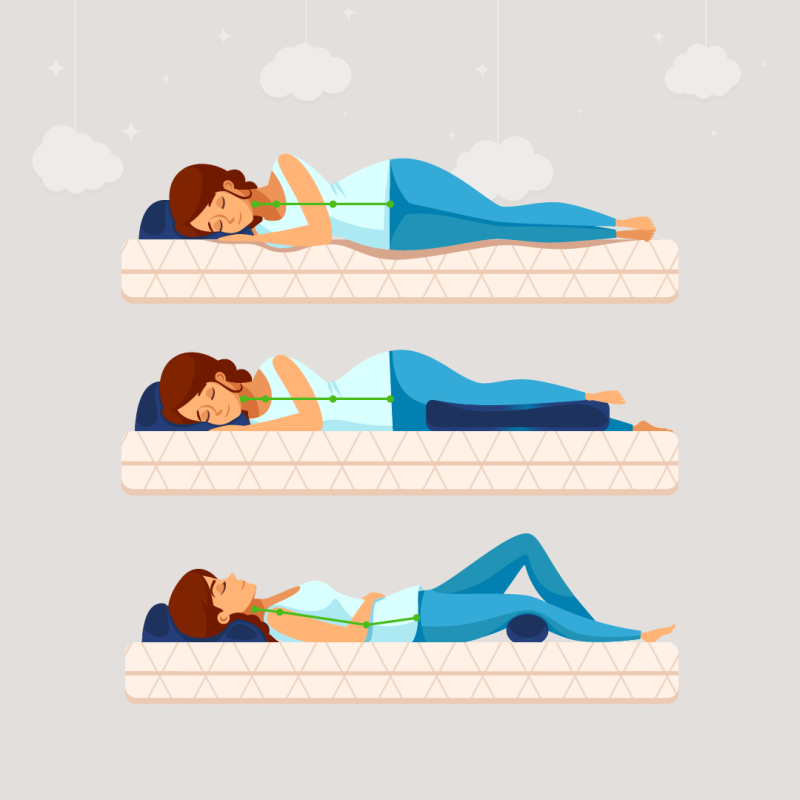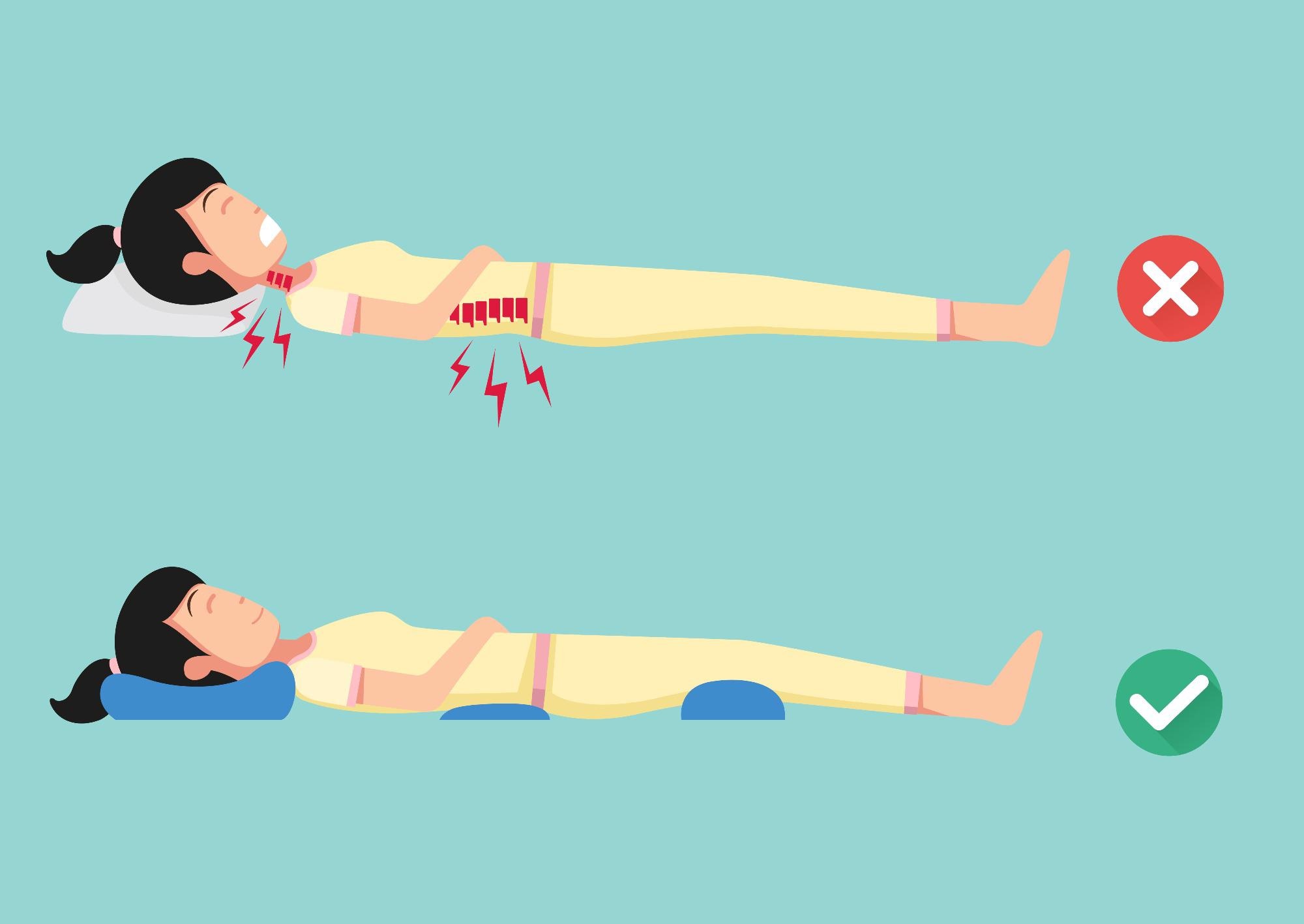
Best Sleeping Positions to Prevent Neck Pain Reflux and Keep Your Heart Healthy
The way you sleep affects much more than how rested you feel in the morning. Your sleeping position can influence your posture, digestion, blood circulation, and even your heart health. Many people experience neck pain, acid reflux, or discomfort during sleep without realizing that their sleeping position is partly to blame. By adjusting how you sleep, you can greatly improve your overall well-being and wake up feeling truly refreshed. Here are the best sleeping positions to prevent neck pain, control reflux, and support a healthy heart.
1. Sleeping on Your Back – The Best for Spine and Neck Alignment
Sleeping on your back is often considered the healthiest position because it allows your head, neck, and spine to rest in a neutral position. When your body is properly aligned, pressure is evenly distributed, reducing the risk of neck stiffness and back pain.
To maximize comfort, use a thin pillow that supports the natural curve of your neck, and place a small pillow under your knees to maintain spinal alignment. This position helps prevent neck pain caused by twisting or bending awkwardly during the night.
Additionally, sleeping on your back is beneficial for heart health because it allows for better circulation and reduces unnecessary pressure on the chest. However, this position might not be ideal for those who snore or suffer from sleep apnea, as it can worsen airway obstruction.
2. Sleeping on Your Left Side – The Best for Digestion and Heart Health
If you struggle with acid reflux or heartburn, sleeping on your left side is highly recommended. This position takes advantage of the natural shape of your stomach and esophagus, keeping stomach acid from flowing back up into your throat.
Sleeping on your left side also improves blood flow throughout the body and reduces pressure on the heart. The heart sits slightly to the left of the chest, and when you sleep on your left side, it can pump blood more easily. This position also enhances lymphatic drainage, helping your body remove waste and toxins more efficiently.
For better neck and back support, use a firm but soft pillow to fill the gap between your shoulder and head, keeping your spine straight. You can also place a pillow between your knees to reduce strain on your lower back and hips.
3. Sleeping on Your Right Side – Good for Comfort but Use with Caution
Sleeping on the right side is more comfortable for some people, but it’s not always ideal for those with heart problems or reflux. This position can slightly compress the heart and make acid reflux worse because of the stomach’s natural placement. However, for pregnant women, alternating between the left and right sides can improve comfort and reduce pressure on the uterus.
To minimize discomfort, try keeping your head elevated using an extra pillow or an adjustable bed. This helps prevent reflux and ensures smoother breathing throughout the night.
4. Avoid Sleeping on Your Stomach – The Worst for Your Neck and Spine
While some people find sleeping on their stomach relaxing, it’s actually one of the least healthy positions. This position twists your neck and spine unnaturally, putting pressure on muscles and joints. Over time, it can cause neck pain, numbness, and even nerve irritation.
If you can’t sleep in any other position, place a thin pillow under your stomach and hips instead of your head. This reduces strain on the spine and keeps your back in a more neutral position.
Final Thoughts
Your sleeping position is a powerful tool for improving your health. Sleeping on your back supports spinal alignment, while lying on your left side promotes digestion, prevents reflux, and protects your heart. Meanwhile, the stomach-down position should be avoided whenever possible.
Making small adjustments—such as choosing the right pillow, mattress, or sleeping angle—can lead to big improvements in how you feel every morning. Remember, quality sleep is not just about how long you rest, but also how you rest. A few mindful changes tonight could mean better posture, fewer aches, and a healthier heart tomorrow.
News in the same category


The #1 Food to Unclog Your Arteries Naturally

6 Everyday Foods That Can Help Relieve Common Health Symptoms — According to Science

Nerve damage? 6 best oils to help repair your nerves

1 cup to protect the pancreas (and reduce blood sugar)

10 Warning Signs of Bowel (Colorectal) Cancer You Shouldn’t Ignore

Coconut Water Found To Lower Blood Pressure By As Much As 71% In Study Participants

The deadly sleeping mistake that can trigger heart attack and stroke overnight!

Baking Soda and Castor Oil Can Treat More than 20 Health Problems

Purple Veins on Your Legs

Why Keeping A Lemon In Your Bedroom Is A Great Idea

Nighttime Habits That Increase Your Risk of Stroke

4 Types of Shoulder Pain That May Signal Dangerous Cancer — Don’t Mistake Them for Simple Joint Problems

6 Body Parts That Turn Black May Signal Cancer — Don’t Ignore Them

The Amazing Power of Caesalpinia pulcherrima (Peacock Flower)

White Bumps or Spots on Lips: Causes and Effective Treatments

Corn Silk: 30 Health Benefits and How to Use It

Turmeric Dosage: How Much You Actually Need for Arthritis, Cancer, and Other Diseases

Better Than Medicine? The Shocking Truth About Dates & Blood Sugar!
News Post

Long-term melatonin use linked to increased heart failure risk, new study suggests

The #1 Food to Unclog Your Arteries Naturally

Could This Vibrant Beetroot Lip Balm Be Your Secret to Soft, Rosy Lips?

6 Everyday Foods That Can Help Relieve Common Health Symptoms — According to Science

This Homemade Coffee & Turmeric Eye Cream Will Erase Your Dark Circles

How to grow clove plant at home – from seed to spice

7 Benefits Of Papaya Seeds & How To Consume Them Correctly

Chanca Piedra (Stonebreaker): Benefits and Uses

Nerve damage? 6 best oils to help repair your nerves

Red Onion for Hair Growth: How This Overlooked Natural Remedy Can Stop Hair Fall and Boost Thickness Fast

Banana and Coffee: Powerful combination with surprising benefits

1 cup to protect the pancreas (and reduce blood sugar)

Manraj’s Journey: A Brave Little Fighter Who Beat Cancer

The Day Rick Swope Saved Jo-Jo the Chimp: A Heroic Act of Compassion

A Dramatic Rescue: The Courageous Effort to Save a Mother and Calf Elephant in Thailand

The Orange Cat and the Bears: A Friendship You Have to See to Believe

Little-known wonderful uses of baking soda in gardening

Remembering Tim Franklin: A Husband, Father, and Friend Who Loved With His Whole Heart

Abused Genius Turns King: The Lost Experiment That Became Legend of the Jungle
